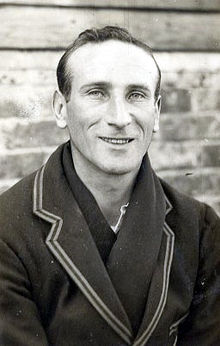
Back دوجلاس جاردين Arabic دوجلاس جاردين ARZ ডগলাস জারদিন Bengali/Bangla داگلاس جاردین Persian Douglas Jardine French ഡഗ്ലസ് ജാർഡീൻ Malayalam डग्लस जार्डिन Marathi Douglas Jardine SIMPLE டக்ளஸ் ஜார்டீன் Tamil ڈگلس جارڈائن Urdu
 Jardine in 1932 | ||||||||||||||||||||||||||||||||||||||||
| Personal information | ||||||||||||||||||||||||||||||||||||||||
|---|---|---|---|---|---|---|---|---|---|---|---|---|---|---|---|---|---|---|---|---|---|---|---|---|---|---|---|---|---|---|---|---|---|---|---|---|---|---|---|---|
| Full name | Douglas Robert Jardine | |||||||||||||||||||||||||||||||||||||||
| Born | 23 October 1900 Malabar Hill, Bombay, Bombay Presidency, British India | |||||||||||||||||||||||||||||||||||||||
| Died | 18 June 1958 (aged 57) Montreux, Vaud, Switzerland | |||||||||||||||||||||||||||||||||||||||
| Nickname | The Iron Duke | |||||||||||||||||||||||||||||||||||||||
| Batting | Right-handed | |||||||||||||||||||||||||||||||||||||||
| Bowling | Right-arm leg break | |||||||||||||||||||||||||||||||||||||||
| Role | Top-order Batsman | |||||||||||||||||||||||||||||||||||||||
| International information | ||||||||||||||||||||||||||||||||||||||||
| National side | ||||||||||||||||||||||||||||||||||||||||
| Test debut (cap 235) | 23 June 1928 v West Indies | |||||||||||||||||||||||||||||||||||||||
| Last Test | 10 February 1934 v India | |||||||||||||||||||||||||||||||||||||||
| Domestic team information | ||||||||||||||||||||||||||||||||||||||||
| Years | Team | |||||||||||||||||||||||||||||||||||||||
| 1920–1923 | Oxford University | |||||||||||||||||||||||||||||||||||||||
| 1921–1933 | Surrey | |||||||||||||||||||||||||||||||||||||||
| 1925–1933/34 | Marylebone Cricket Club | |||||||||||||||||||||||||||||||||||||||
| Career statistics | ||||||||||||||||||||||||||||||||||||||||
| ||||||||||||||||||||||||||||||||||||||||
Source: ESPNcricinfo, 17 May 2008 | ||||||||||||||||||||||||||||||||||||||||
Douglas Robert Jardine (23 October 1900 – 18 June 1958) was an English cricketer who played 22 Test matches for England, captaining the side in 15 of those matches between 1931 and 1934. A right-handed batsman, he is best known for captaining the English team during their successful 1932–33 Ashes tour of Australia. During that series, England employed "Bodyline" tactics against the Australian batsmen, headed by Donald Bradman, wherein bowlers pitched the ball short on the line of leg stump to rise towards the bodies of the batsmen in a manner that some contemporary players and critics viewed as intimidatory and physically dangerous. As captain, Jardine was the person responsible for the implementation of Bodyline.
A controversial figure among cricketers, partially for what was perceived by some to be an arrogant and patrician manner, he was well known for his dislike of Australian players and crowds, and thus was unpopular in Australia, especially so after the Bodyline tour. However, many who played under his leadership regarded him as an excellent and dedicated captain. He was also famous in cricket circles for wearing a multi-coloured Harlequin cap.
After establishing an early reputation as a prolific schoolboy batsman, Jardine played cricket for Winchester College, attended the University of Oxford, playing for its cricket team, and then played for Surrey County Cricket Club as an amateur. He developed a stubborn, defensive method of batting which was considered unusual for an amateur at the time, and he received occasional criticism for negative batting. Nonetheless, Jardine was selected in Test matches for the first time in 1928, and went on to play with some success in the Test series in Australia in 1928–29. Following this tour, his business commitments prevented him from playing as much cricket. However, in 1931, he was asked to captain England in a Test against New Zealand. Although there were some initial misgivings about his captaincy, Jardine led England in the next three cricket seasons and on two overseas tours, one of which was the Australian tour of 1932–33. Of his 15 Tests as captain, he won nine, drew five and lost only one. He retired from all first-class cricket in 1934 following a tour to India.
Although Jardine was a qualified solicitor he did not work much in law, choosing instead to devote most of his working life to banking and, later on, journalism. He joined the Territorial Army in the Second World War and spent most of it posted in India. After the war, he worked as company secretary at a paper manufacturer and also returned to journalism. While on a business trip in 1957, he became ill with what proved to be lung cancer and died, aged 57, in 1958.